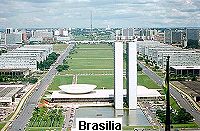South American and Arab countries pledge closer scientific cooperation
Nations in South America and the Arab world have committed themselves to increased scientific cooperation as part of the Brasilia Declaration, signed in the Brazilian capital following the first South America-Arab Summit on 11 May. The declaration includes a statement of intent by all signatories to create and fund a Scientific and Technological Development Program, which would initially focus on the following areas of mutual interest: desertification and semi-arid lands, management of water resources, irrigated agriculture, biotechnology and genetic engineering, climate forecasting, soil dressing, cattle herding. Initiatives to deliver technological innovations and integrated management of water resources are highlighted as being of particular importance, and the declaration calls for the development of a framework for bi-regional cooperation in this field. The document stresses the 'urgent need' to establish cooperation programmes between the leading universities and research institutes in each region, and to promote an exchange of experts, researchers and university professors. It also calls for 'active and generous support' from the international community for efforts to fight diseases such as HIV/AIDS, malaria and tuberculosis. Finally, Arab and South American countries declare themselves committed to the protection of intellectual property rights, while also 'recognising that intellectual property protection should not prevent developing countries from access to basic science and technology [...] particularly concerning public health.' Hassan Abdel Aal Moawad, an Egyptian professor of microbial biotechnology and delegate at the summit, told SciDevNet: 'The scientific issues in the declaration are very good ones and deal with specific areas of common interest, but more planned work is needed.' Professor Moawad said that a network of research centres and a database of scientists in both regions should be set up to enhance research collaboration. He added that there are around 12 million people of Arab origin living in South America that could act as a bridge between the two regions in all fields, including science and technology. The Brasilia summit was convened by the President of Brazil, Luiz Inacio Lula da Silva, and attended by representatives from 22 Arab and 12 South American countries. It was co-chaired by Mr da Silva and Algerian President Abdelaziz Buteflika.



